

People With Dark Personalities Tend to Create a Physically Attractive Veneer. Which personality traits are associated with physical attractiveness?
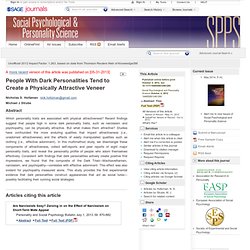
Recent findings suggest that people high in some dark personality traits, such as narcissism and psychopathy, can be physically attractive. But what makes them attractive? Studies have confounded the more enduring qualities that impact attractiveness (i.e., unadorned attractiveness) and the effects of easily manipulated qualities such as clothing (i.e., effective adornment). Men's insecurities may lead to sexist views. He loves her, he loves her not.

A new study led by Joshua Hart, assistant professor of psychology, suggests that men’s insecurities about relationships and conflicted views of women as romantic partners and rivals could lead some to adopt sexist attitudes about women. The study was recently published in Personality and Social Psychology Bulletin, a peer-reviewed journal. Hart and his co-authors, Jacqueline Hung '11, a former student of Hart's, and psychology professors Peter Glick of Lawrence University and Rachel Dinero of Cazenovia College, surveyed more than 400 heterosexual men to gauge their responses to questions about their attachment style, hostile and benevolent sexism, and views on romance. Attachment style refers to the way people relate to others in the context of intimate relationships, defined by two personality traits: attachment anxiety and attachment avoidance. Hostile sexism depicts women as mean-spirited foes who aim to dominate men.
Babies prefer individuals who harm those that aren't like them (w/ video) Infants as young as nine months old prefer individuals who are nice to people like them and mean to people who aren't like them, according to a new study published in Psychological Science, a journal of the Association for Psychological Science.
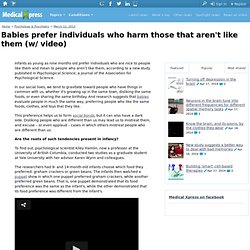
In our social lives, we tend to gravitate toward people who have things in common with us, whether it's growing up in the same town, disliking the same foods, or even sharing the same birthday. Does confidence really breed success? 3 January 2013Last updated at 19:32 ET By William Kremer BBC World Service Research suggests that more and more American university students think they are something special.

High self-esteem is generally regarded as a good thing - but could too much of it actually make you less successful? About nine million young people have filled out the American Freshman Survey, since it began in 1966. It asks students to rate how they measure up to their peers in a number of basic skills areas - and over the past four decades, there has been a dramatic rise in the number of students who describe themselves as being "above average" for academic ability, drive to achieve, mathematical ability and self-confidence. The Internet 'Narcissism Epidemic' Don't let popularity set your standard. stuartpilbrow/Flickr We are in the midst of a "narcissism epidemic," concluded psychologists Jean M.

Twnege and W. Keith Campbell in their 2009 book. One study they describe showed that among a group of 37,000 college students, narcissistic personality traits rose just as quickly as obesity from the 1980s to the present. Those who had high scores on grandiose exhibitionism tended to amass more friends on Facebook. Wealth and the Inflated Self. Narcissism Breeds Belief in One’s Own Creativity. British researchers report narcissists are more likely than most to engage in creative activities.
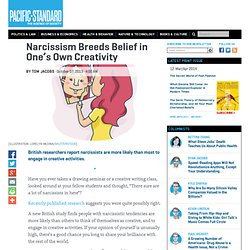
Have you ever taken a drawing seminar or a creative writing class, looked around at your fellow students and thought, “There sure are a lot of narcissists in here”? Recently published research suggests you were quite possibly right. A new British study finds people with narcissistic tendencies are more likely than others to think of themselves as creative, and to engage in creative activities. If your opinion of yourself is unusually high, there’s a good chance you long to share your brilliance with the rest of the world.
Psychology Uncovers Sex Appeal of Dark Personalities. Although most people probably don’t consider narcissism or psychopathy desirable qualities in either their friends or romantic partners, many of us are mysteriously drawn toward people with these personality traits.
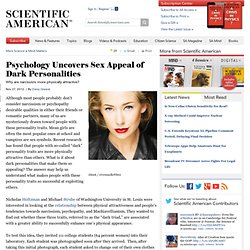
Mean girls are often the most popular ones at school and vampires are sex symbols. Recent research has found that people with so-called “dark” personality traits are more physically attractive than others. What is it about dark personalities that make them so appealing? The answer may help us understand what makes people with these personality traits so successful at exploiting others. Nicholas Holtzman and Michael Strube of Washington University in St. To test this idea, they invited 111 college students (64 percent women) into their laboratory. True story: Not everyone lies frequently. 13-Dec-2013 [ Print | E-mail ] Share [ Close Window ] Contact: John Paul Gutierrezjpgutierrez@icahdq.org International Communication Association Washington, DC (December 10, 2013) – Does everybody lie?
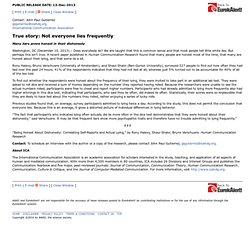
We are taught that this is common sense and that most people tell little white lies. Internet troll personality study: Machiavellianism, narcissism, psychopathy, sadism. Medioimages/Photodisc In the past few years, the science of Internet trollology has made some strides.

Last year, for instance, we learned that by hurling insults and inciting discord in online comment sections, so-called Internet trolls (who are frequently anonymous) have a polarizing effect on audiences, leading to politicization, rather than deeper understanding of scientific topics. That’s bad, but it’s nothing compared with what a new psychology paper has to say about the personalities of trolls themselves.